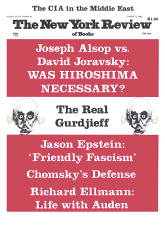In Rome on the Campo di Fiori
baskets of olives and lemons,
cobbles spattered with wine
and the wreckage of flowers.
Vendors cover the trestles
with rose-pink fish;
armfuls of dark grapes
heaped on peach-down.
On this same square
they burned Giordano Bruno.
Henchmen kindled the pyre
close-pressed by the mob.
Before the flames had died
the taverns were full again,
baskets of olives and lemons
again on the vendors’ shoulders.
I thought of the Campo di Fiori
in Warsaw by a carousel
one clear spring evening
to the strains of a carnival tune.
The bright melody drowned
the salvos from the ghetto wall,
and couples were flying
high in the cloudless sky.
At times wind from the burning
would drift dark kites along
and riders on the carousel
caught petals in mid-air.
That same hot wind
blew open the skirts of the girls
and the crowds were laughing
on that beautiful Warsaw Sunday.
Someone will read as moral
that the people of Rome or Warsaw
haggle, laugh, make love
as they pass by martyrs’ pyres.
Someone else will read
of the passing of things human,
of the oblivion
born before the flames have died.
But that day I thought only
of the loneliness of the dying,
of how, when Giordano
climbed to his burning
he could not find
in any human tongue
words for mankind,
mankind who live on.
Already they were back at their wine
or peddled their white starfish,
baskets of olives and lemons
they had shouldered to the fair,
and he already distanced
as if centuries had passed
while they paused just a moment
for his flying in the fire.
Those dying here, the lonely
forgotten by the world,
their tongue becomes for us
the language of an ancient planet.
Until, when all is legend
and many years have passed
on a new Campo di Fiori
rage will kindle at a poet’s fire.
(Warsaw, 1943)
The meaning of this poem depends on the time and place of its writing—Easter 1943, Warsaw—but also on something which not even the best translation can convey. For the original forms part of a large body of poems in Polish on the subject of the Holocaust, many of them written by non-Jews. Taken out of that context, of which the American reader can hardly be aware, it may appear as something exceptional. John Hersey in his novel The Wall, while mentioning my poem, suggests the Warsaw Ghetto as the place of its origin. In fact, the poem appeared in an underground anthology of poetry, Out of the Abyss (Z Otchlani), which was intended as a voice of human solidarity with the victims on the other side of the “wall.” Events soon added a peculiar postscript both to the anthology and to my poem: for two months the city of Warsaw was turned into ash and rubble during the summer uprising of 1944 against the Nazis, at a cost of two hundred thousand lives, mostly civilian. In October, the entire surviving population was deported. And it is impossible not to think with sadness of the mob in my poem, whose turn was to come so soon.
This Issue
October 23, 1980



